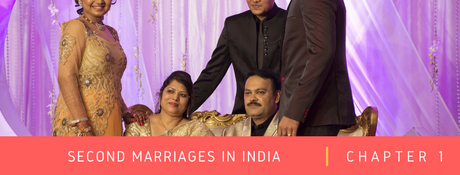 Your first marriage did not work out and it's history. Should you now consider a second marriage? Is it worth all the trouble to find someone who will be your soulmate for the rest of your life?
Your first marriage did not work out and it's history. Should you now consider a second marriage? Is it worth all the trouble to find someone who will be your soulmate for the rest of your life?
We created this in-depth guide that answers all these questions and more.
Chapter 1: Second marriages in India
 Statistics on second marriages in India
Statistics on second marriages in India

Here are some statistics on second marriages in India based on the 2011 census.
According to the 2011 census of India, of the total population that's married, 0.29% of the couples are separated and 0.11% of the couples are divorced. About 4.5% of the population is widowed. The pool of people who are likely to go for second marriage is about 4.9% of the married population.
When you explore the age distribution of women who are widowed, there is a sharp spike in women in the age group of 35 to 39 who are categorised as widowed, divorced or separated. In the case of men, there is a gradual increase in the category of divorced, widowed or separated and the sharp spike that you see in the women is absent.
Divorce, widow, and separation rates vary by religions. According to the 2011 census, about 5% of the Hindus are reported to be divorced, widowed or separated while it is lower among Muslims (3.7%) and Christians (2.2%).
The census does not provide any statistics on second marriages and the longevity of the second marriages. However, matchmaking sites that cater to the second marriage market seem to be doing well. Recently, Bharat Matrimony acquired SecondShadi.com and is a testimony to the attractiveness of this market for service providers.
In India, as divorce is becoming more acceptable, second marriages are bound to be accepted as a norm rather than as an exception. The desire for human companionship and intimacy is a natural instinct irrespective of the past marital status of an individual.
How different religions view second marriages?
Marriages are governed by religions and in India, religion plays an important role not only in performing the marriage ceremony but also governs the key decisions that the couple makes. This includes divorce and second marriages.
Let's take a look at how religions govern second marriages in India.
Second marriage in IslamIn India, Muslim marriages, divorce, and second marriages are governed by The Muslim Personal Law (Shariat) Application Act, 1937. According to this law, Muslims in India (men as well as women) have the freedom to remarry if they are divorced or widowed.
For women of any age, there is a waiting time for remarriage if the marriage is consummated before the divorce. This is called Iddat or a period of waiting. The waiting time in the event of a divorce after a consummated marriage is for 3 menstrual cycles. In the event of a remarriage after the death of a husband, the waiting time is 4 months and 10 days. In the event of a pregnancy, the woman has to wait for second marriage till the child is born irrespective of how the separation happened in the previous marriage.
Is second marriage allowed in Islam without divorce?Islam does allow polygamy; however, the woman cannot have more than one husband at a time. The practice of polygamy among Muslim men in India is not very different from that of Hindus and in fact lower than what is seen in other religions such as Buddhists and Jains.
Second marriage according to HinduismUnlike Christianity or Islam, marriages in Hinduism is a sacred union blessed by the divine and not a civil contract. Hence it has always been difficult to sell the idea of remarriage even after the death of a spouse. In fact, the practice of Sati in pre-independence India is a testament to the fact that the idea of living, let alone getting into a second marriage was unthinkable. Of course, men have different standards!
So, is second marriage allowed in Hinduism?Here is an extract from Manusmriti, one of the many ancient legal texts that govern Hinduism, highlights the attitude of Hinduism towards second marriage:
Let no intelligent man, after having given his daughter to one man, give her again to another; for he who gives and then gives is guilty of deceit (Manu 9;71).
However, Manusmriti lists several reasons when a woman or man can remarry. These include:
1. If a man or woman fails to disclose their issues (such as physical ailments) before marriage
2. In case of prolonged absence or disappearance
3. If the husband renounces the world
4. If the wife squanders her husband's wealth, spreads false rumors, attempts to take his life or mistreats him
5. In the case of impotency or chronic disease contracted by either party
The Hindu Marriage Act of 1955 governs the modern interpretation of second marriages and the circumstances under which they cannot happen:
Neither party should have a living spouse or be related to each other in such a way that it marriage is prohibited as per their community. Divorce is a must for a second marriage. Any type of illness that stops them from giving consent for marriage is also a ground for disqualifying a marriage (applicable for first marriages as well).
The grounds for ending a marriage and paving the way for a second marriage as per the Hindu Marriage Act mirrors the conditions laid by the Manusmriti.
The Hindu Marriage Act also governs marriages in other religions such as Jainism, Sikhism, and Buddhism as they are all considered to be derivates of the Hindu religion and customs.
Second marriage according to ChristianityAccording to the Bible, divorce is possible in two instances - when a man or a woman commits adultery or when one of them abuses the other. The apostle Paul taught that if an unbelieving spouse leaves a believer, the believer is not bound to the marriage relationship, but is free to remarry!
And here are a couple of verses from the Bible:
Mathew 19:9
" And I say to you, whoever divorces his wife, except for immorality, and marries another woman commits adultery. "
Romans 7:2
" For the married woman is bound by law to her husband while he is living; but if her husband dies, she is released from the law concerning the husband. "
It appears, according to the Bible, it's OK to have a second marriage if you are widowed.
A strict interpretation of Christianity outlaws divorce that's granted on the basis of any reason not outlined in the bible. So there is no question of second marriages. However, in reality, divorce and a second marriage is a legally accepted practice among Christian populations worldwide.
In India, Christians are bound by the Indian Christian Marriage Act of 1872. Christians of Goa alone have their own civil code. There is nothing in the law against second marriages. As long as the man and the woman are either divorced or widowed, second marriages are legal.

Looking for a second marriage in India? Start with these matchmaking sites
The idea of divorce and second marriage is no longer a scandalous affair (at least in most urban centers). If you are thinking of a second marriage you can start off by exploring these matrimonial sites.
Divorceematrimony.comProbably a leader in the online second marriage matchmaking business in India. The acquisition of Secondshaadi.com makes it a compelling platform for people who want to try marriage the second time. Divorceematrimony.com is very popular among the South Indians worldwide.
Website: www.divorceematrimony.com
Shaadi.comShaadi.com claims to have over 100,000 profiles of divorced men and women looking for second marriage. Considering the popularity of this portal among North Indians and Indians living abroad, you should definitely try Shaadi.com.
Website: https://www.shaadi.com/matrimony/divorcee-matrimony
JeevansathiJeevansathi has the third largest database of profiles among the top three matchmaking sites in India. If you are in North India, Jeevansathi will have a large selection of matrimonial profiles for second marriage.
Website: https://www.jeevansathi.com/divorcee-matrimony-matrimonials
So how do you present yourself in a matchmaking site for a second marriage? Copy these 5 sample matrimonial profile descriptions for divorcees.
Chapter 2: Is second marriage a good idea?

Once bitten, twice shy!
People who have gone through a divorce or been widowed often wonder if second marriage is needed. Answering this questions is difficult as every individual has a different opinion about what's the best course of action.
While we don't have data on divorce rates in India for second marriages, in the US, second marriage divorce rates are higher when compared to first marriages.
Just goes to show that there is no guarantee that your second marriage will work better than your first marriage.
Before a decision can be made, you need to understand the pros and cons of a second marriage.
Second marriage problems and how to handle them
Here is a list of all the challenges you are likely to face in a second marriage.
1. Did you make the decision too soon?One of the most common mistakes people make is to get married on the rebound. When you see second marriage as an instant pain reliever to get over the deep sense of loss, anguish, and betrayal experienced in the first marriage, there is a problem of taking a decision in haste without thinking about your emotional readiness.
Especially in India, failed marriages create additional pressure on parents who want to set the wrong right. In spite of changing attitudes, parents and extended relatives see a failed marriage in their family as a loss of face.
When an arranged marriage fails, parents take the blame for arranging it in the first place and double up their efforts to get their son or daughter married again. The sense of urgency can completely override the need for healing and taking stock to figure out what went and wrong. The son or daughter find themselves being pushed into yet another marriage that they were not ready for.
2. Not being able to let go of your pastEven when your marriage is successful and you are in a stable relationship, you may be thinking about your first love that never panned out or the girl you almost married. Some of us will be never able to forget our past relationships (good and bad) and our perception of our current partners is always coloured by our past relationships.
Not being able to let go of the past can cause you to come to wrong conclusions about your current spouse or start anticipating bad behavior based on patterns you have seen from your failed relationship. When you become judgemental and opinionated, you might fail to see the reality and completely jeopardize the existing relationship.
3. Your children from your first marriage are unhappyManaging your relationship with children from your first marriage and dealing with stepchildren can cause considerable anguish. While you may have made up your mind about a second marriage and happy with the partner you chose, children have their own minds and issues.
If they are very young, it is relatively easy for them to adjust to a new family unit. If they are adolescents, they are already passing through an emotional roller coaster and the added trauma of adjusting to a new life with a new parent might be difficult for them to handle.
Families with stepchildren are especially vulnerable to breakdown as competition and jealousy in play. The pressure of dealing with these issues can easily get to the couple and put the marriage at risk.
4. You repeat the same mistakes the second timeSome of us fail to internalise the lessons learned from our first marriage and end up repeating the mistakes. We fall back into the same old habits and behavior patterns that caused us grief. These could range from abusive behavior, drinking habits to becoming clingy and needy or overbearing in your dealings with your partner.
How you go about looking for a match in a second marriage can also lead you down the same path as before. In India, the arranged marriage process doesn't give you the time and the space needed to know the person before marriage. While this may not be true among wealthier and educated sections of the society, a vast majority of Indians are conditioned to accept the family's decision about the marriage. In the end, second marriage might end up being a game of roulette.
5. You are paranoid about the success of your second marriagePast failures can hurt us a lot and some of us become obsessed about not repeating our mistakes or overcompensating for our perceived drawbacks. We start overanalysing the behavior of our partners and begin suspecting their every move at every turn.
That's not all, we end up losing two simple virtues that are a bedrock of any marriage - patience, and forgiveness. We see a red flag and then react to it immediately without giving a chance for the spouse to explain their side of the story.
On the other end of the spectrum, we end up going overboard to satisfy the spouse just to make sure they don't lose interest in the marriage. This is an unsustainable behavior with the risk of being taken for granted.
6. Adjusting to the new extended familyIn India, arranged marriages are especially challenging for women. Some of them end up living in a joint-family setting or have to deal with the pressure of embracing the in-laws and the extended family as their own even before getting to know the spouse! They are expected to respect the in-laws and cater to their every need. With a second marriage, the process repeats and for some women, this might be as good as reliving a nightmare that ended in a divorce.
In some cases, even when there is complete compatibility with the spouse, the extended family might be the cause of significant friction in the marriage. This is true irrespective of whether it is the first marriage or the second marriage.
7. Dealing with financial stressesFinancial issues are one of the leading causes of divorce. Second marriages are not immune to the issue. In fact, when it involves children, property, and inheritance, a second marriage can throw some surprising twists.
Stepchildren may fight over money, the ancestral property may come under dispute as other family members may not like the spouse from the second marriage, and the burden of supporting a larger family unit can put additional strain on the family's finances. Some men who end up getting into a second marriage may find that the cost of alimony has adversely impacted their ability to support the new family.
Financial issues resulting from poor spending habits, undisclosed debts, incompatible saving and financial planning goals, and bad choice of investments could derail any marriage.
Can a second marriage be successful?
Definitely, yes.
Second marriages are no different from first marriages. It's just that second marriages come with some additional strings and issues that can derail your happiness. If you really prepare for it and find a partner who understands the challenges of a second marriage, you will probably ride into the sunset happily.
So how to make a second marriage successful?Let's look at some of the key factors that can help you have a stable and happy second marriage.
1. Ability to leave the past behindOne of the biggest hurdles to building a bond with your spouse in the second marriage is the baggage from the past. Second marriages can be successful if you can leave the past behind completely and take the plunge again with renewed confidence and hope. It is important not to rush into a second marriage and let it happen at a point when it feels right. This is quite a challenge in the Indian context where there is immense pressure to get remarried.
2. Learn to trust your spousePast betrayals, mental or physical abuse could make it difficult for people to start trusting others even if the other party is your spouse from a second marriage. However, if you can learn to trust your spouse handle small chores and tasks, you could gradually raise the stakes. Even at work, employees who are considered trustworthy get more responsibilities and this doesn't happen overnight!
3. Create positive interactions deliberatelyAccording to Dr. John Gottman of the Gottman Institute, happy couples have a 5:1 ratio of conflicts. This means for every negative interaction, they have five positive interactions.
You can deliberately create these positive interactions by doing things together that takes you away from stressful situations. It could be as simple as tending the garden together or walking the dog together.
4. Find time to spend time with your spouseContinuing on the previous point, finding time to spend with your spouse should become a habit. Getting alone time in a stress-free environment (that's usually away from home) can give the relationship the needed pressure release and keep the spark alive.
5. Communicate your expectations clearlyCommunication is the key to the success of any marriage. Clearly stating your expectations before marriage and even when you are married will help avoid scenarios where your spouse jumps to a wrong conclusion about your actions and intentions. When you have a conflict, it's better to share your thoughts in a non-threatening tone than to just bottle-up your feelings.
6. Learn to empathise and forgiveMistakes are bound to be made in a second marriage even when the couple is mature and have been through a relationship. The added pressures of dealing with stepchildren, financial burden, and the anxiety of possibly going through a divorce the second time can make second marriages even more challenging. Learning to empathise with the spouse and the children is a trait that can save the marriage.
7. Plan your financesPlanning your finances before you tie the knot the second time will give you the opportunity and time to build a relationship as opposed to firefighting issues and keeping a tab on payments. Poor finance can trigger disagreements, conflicts, and deep animosity.
If you are planning a second marriage, first plan your finances. Do you have sufficient money to support or contribute to the new family? If this question is addressed up front, you will have fewer troubles to deal with after the marriage.
8. Mend your fences with the former spouseIf you have children from an earlier marriage, it is better to eventually mend your relationship with your former spouse to the extent that access to your children doesn't become an issue or a constant source of tension in your family. If you can pull this off, you will avoid getting into frequent conflicts over child visitation rights, avoid tit-for-tat incidents and not let your anger affect the relationship with your current spouse.
Chapter 3: Second Marriages - Essential questions answered

Would you like to add to our responses?
Email your thoughts and share your experiences to info[at]jodilogik[dot]com. We will publish them if it adds value to our responses
How successful are second marriages after divorce?
A lot of statistics have been thrown around in online articles about the success rates of second marriages in the US after a divorce. In India, there is no authoritative data on the success rates of second marriages.
A paper by Betsey Stevenson and Justin Wolfers from the Wharton School, the University of Pennsylvania titled "Marriage and Divorce - Changes and their Driving Force" has some interesting" has specific data on the success of second and third marriages in the US.
As you can see from the data, about 62 to 72% of men and women who are 45 years of age are in their second marriages and for the same age group, about 26 to 36% have ended their second marriage. The success rate of second marriage also seems to be more among college grads, while race doesn't seem to have any big impact.
Data specific to India is not available. However, divorce rates in India are typically lower compared to that of western countries. Conservatively, we can assume that the success rate for second marriages after divorce should be over 70%.
Should you go for a second marriage after the death of your spouse?
The answer is not simple. The short answer is it depends on the individual and whether he or she has gone through the grieving process completely. Psychologists have found that men often ten to remarry after the death of the wife faster than women.
Apparently, men grieve different from women and some of them may see remarriage as an opportunity to regain what they lost. Women seem to cope with the grieving process better than men and probably feel the need to think of a second marriage later than men.
If you have reached a point where you feel you need to move on and find someone to share your life with, a second marriage is not a bad idea.
Should you go for a second marriage after 40?
When you are older, you are probably more set in your own ways. You have likes and dislikes and it will be difficult to change your worldview and opinions. The same is true for people who go for a second marriage after 50. You may have to work a lot more to accommodate your spouse's lifestyle, habits, and interests.
Yes, you can definitely go for a second marriage after 40 but do so only after knowing who you are marrying. If you plan on an arranged marriage, make sure you have plenty of opportunities to interact with the prospective match before taking a decision.
Does second marriage affect my chances of inheriting property?
No, second marriage does not affect your chances of inheriting property from your parents as long as there is no will left behind by your parents that does not leave you a share. This does not apply to ancestral property and you will have partial or full rights to it based on who else has the same rights (such as your siblings or one of your parents, step-parent, step-siblings).
If you want to claim a share of your spouse's ancestral property or pension, you need to make sure that your marriage to your spouse was legal.
In scenarios where a man marries the second time without divorcing from his first wife, the second marriage is not legal and the second wife has no claim over the husband's property. However, his children with the second wife have a legitimate claim over the property after his death. More on this topic here.
If you have a child or children and you marry the second time after the death of your husband, you and your children will continue to enjoy the share in the property of your first husband. Step-children from your second marriage will not have any claim over your first husband's property.
Does second marriage affect my chances of adopting a child in India?
No, a second marriage does not affect your chances of adopting a child in India. You should meet all the requirements specified by the Central Adoption Resource Authority (CARA) that's applicable for all parents. You can read the requirements here.
If you are in a second marriage and would like to adopt your stepson or stepdaughter, you can do so with the consent of your spouse's ex-husband or wife. If the child in question is the center of a legal battle for custody, you cannot adopt the child until the court takes a decision.
So what happens when your ex-husband or wife abandons you and you remarried on the basis of abandonment? How do you get the consent of your missing ex-spouse? Read this interesting thread.
How to handle finances in a second marriage?
Here are a few tips that you can consider for managing your finances after a second marriage.
1. Disclose your assets and debts and make sure you have a clear picture of your new spouse's financial situation.
2. Discuss your inheritance and time frames for the inheritance to materialise.
3. Make sure you both know about the claims of their former spouses and children. If it's an arranged marriage, make sure you review the divorce order from the court and not go just on the basis of the claims.
4. Continue to maintain separate bank finances/accounts to manage your salary/income and incidental expenses.
5. Create a joint account to pool money to run the household expenses.
6. Understand that every individual has a different approach to spending money. If money causes significant stress in the relationship, it's better to see a marriage counselor.
Should I change my surname after my second marriage?
There is no legal requirement for women to change their surname after marriage (be it first or second). The practice of changing the surname to that of the Husband's surname is just a choice.
Changing your children's names (born in your first marriage) to reflect the name of their step-father and adding the stepfather as the father in all official documents requires an adoption. This will involve seeking a no-objection certificate (NOC) from the biological father. Here is what can happen if you change the name of your child without the NOC.
Looking for a fresh start? Create your biodata on Jodi Logik

